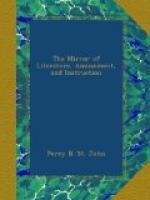I saw Sir Egerton Brydges in the streets, was introduced to him, and recalled to his mind our rencontre at Mr. Carter’s at Deal, thirty years ago. He walked feebly, was lame, and had been confined to his bed for many months the preceding winter. He was pale, apparently grief-worn, and had a most grave and melancholy countenance, and languid look; but now and then flashed, both with eyes and words. He amused himself with printing privately, and distributing among his friends a variety of fragments. He complained bitterly of some London agents, who had cheated him most enormously, and whom he was bringing before the Court of Chancery. His common acquaintance complained that he was too grave for them, and that he was deficient in wit and point. They said he was “all sober sadness,” and that he had romantic views of life, and did not know the human character. I had not sufficient conversation with him to judge of this. He was intimate with d’Invernois, who spoke highly of him. He had certainly none of our Irish vivacity, and fulness of imagery. He was rather querulous and prolix, than piquant, and declaimed rather than said sharp things. I said to him, “Why do you not endeavour, in your writings, to accommodate yourself more to the public taste?” He answered, in despair, “I cannot—I have no turn that way. I know the value of the bon-mot, the sarcasm, and the epigram; but I have no ability that way.” And it seemed true; he had no ability that way.
When the old lineal Duke of Norfolk died—I think it was in 1778—the pomp of that mighty house was much abased. His collateral successor, Mr. Howard, of Graystock, was a man of mean and intemperate habits, which were inherited by his son, the late duke, then known by the name of Lord Surry, and who made himself conspicuous as a Whig, and by electioneering contests and intrigues. With this last I was familiar, but soon saw that I could put no trust in him. I wrote many political squibs at his desire—not worth preserving; he was a man of a good deal of spleen, personal as well as political. Charles Fox flattered him, that he might have his aid to the party; but he did not love or respect him. He married an Irishwoman for his first wife. I think his mother’s name was Brockholes. It was amusing to see him in contest with the late Lord Abingdon, whose power of speaking in the House (whatever mental eccentricities he might have) was so great, that many preferred his eloquence even to Lord Chatham’s. The duke was never at rest: he always had some jobs in hand: by which he often put himself into pecuniary embarrassment. His face was very much like that of Cardinal Howard, Temp. Car. II., of whom there are so many engraved portraits. He prided himself upon a common dress, very much like that of a yeoman, or rather country schoolmaster. It was generally a grey coat, with black buttons, and black waistcoat. I once asked him to use his interest for a relation of mine; he readily promised—but




